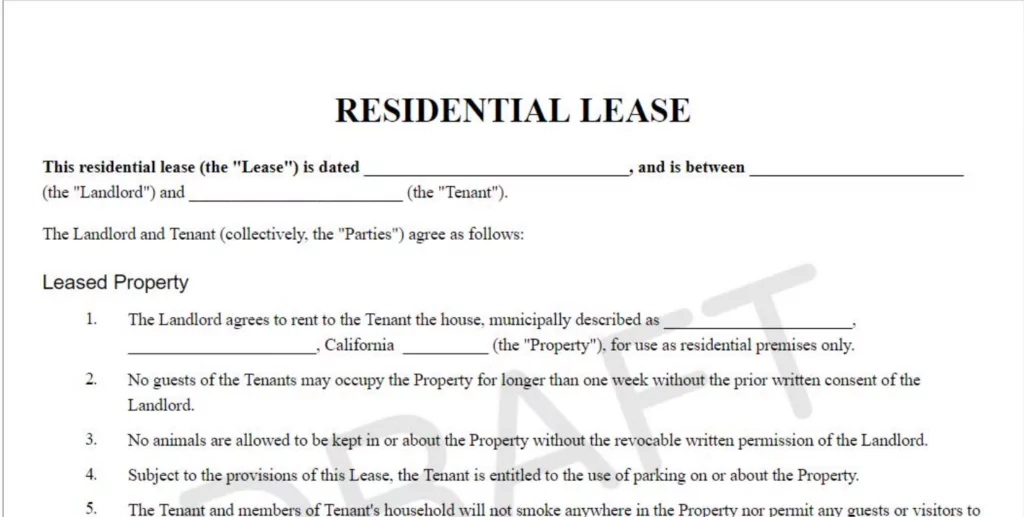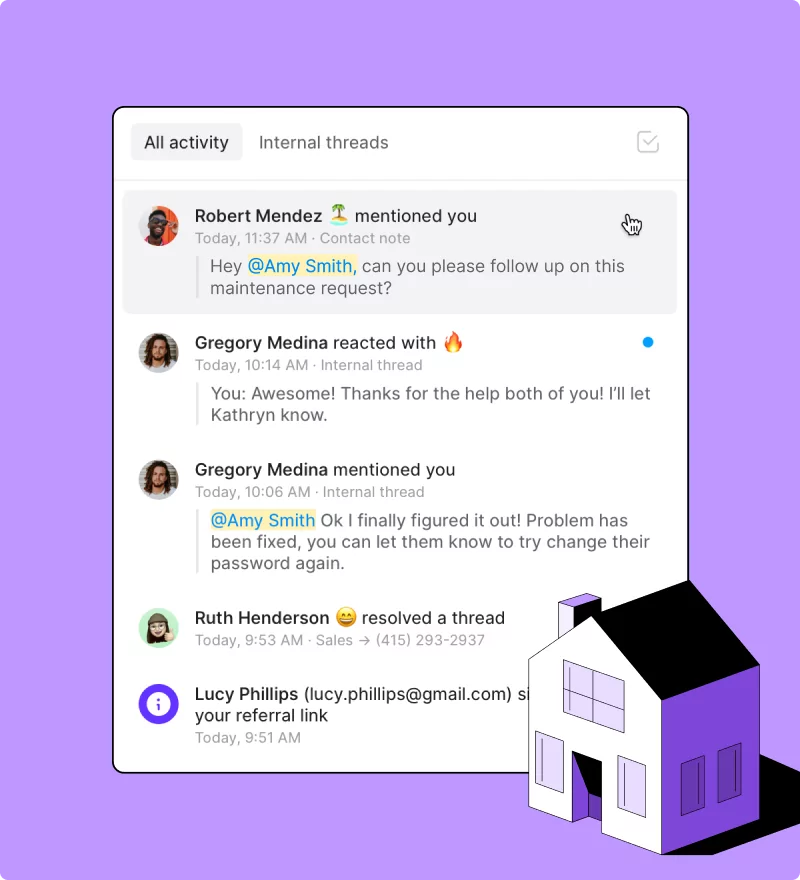If you are a landlord, you are going to have difficult tenants.
Around 5% of landlords have renters who are difficult to get along with. You’re bound to have at least one problematic tenant during your career.
Maybe you have one right now.
From late rent payments to lease violations, it can be incredibly stressful to resolve tricky tenant situations. Maintaining professionalism and complying with state laws adds another layer of complexity to the mix.
With the right communication strategies, however, you can navigate tricky situations with grace.
This guide highlights six practical strategies you can use to deal with problem tenants. We also interviewed two subject matter experts:
- John Tweedie, Regional Property Manager at CLV Group
- Tony Mariotti, Real Estate Broker and CEO of RubyHome
Now, let’s dive into our first tenant management strategy:
Strategy 1: Use auto-reminders for tenants who don’t pay rent on time
Missing rent payments is the #1 issue many landlords face. There are several reasons why it happens — some tenants simply forget (or feign forgetfulness), while new tenants might overlook their rent collection dates.
This is a major time and energy drain, regardless of how many doors you manage. Bigger property managers don’t have time to keep tabs on everyone, much less remind tenants to pay their rent on time.
That’s why automated rent reminders are the easiest way to remind renters of their obligations. These friendly reminders keep tenants informed of payment amounts, rent due dates, and late fee schedules (if you use them).
Just keep in mind the amount you can charge for late fees (as well as the minimum grace period) varies according to state and local laws. Between 5% and 10% of the rent is standard, and most states require you to list them in your lease terms.
How to set up automated rent reminders
First, set up an email/SMS template that automatically goes out to tenants before payment is due. Then, create a late rent reminder template explaining next steps and late fee schedules. Just be sure to familiarize yourself with late fee laws by state before sending reminders.
If you have an OpenPhone account, you can set up an automated rent reminder text like the one below in 15 minutes or less using Zapier and Google Sheets.
Hi [tenant name]! This is a friendly reminder that your upcoming rent of [$X.XX] is due on [XX/XX/XX]. Visit [URL] and log in to your account to make a payment. Feel free to reply to this text if you have any questions or concerns.
Not sure what to write? Check out some rent reminder templates here.
Strategy 2: Use a clear lease agreement to cover property damages
Property damage is almost as certain as paying taxes. In addition to wear and tear, you may also have to deal with extreme or widespread damages — that cost thousands more than the tenant’s security deposit.

When faced with violations or damages, you’ll need a paper trail to enforce the consequences. That typically starts with your lease agreement, which offers protection against lease violations.
John Tweedie, Regional Property Manager at CLV Group, rents properties in the Great White North, and he uses a standard Residential Tenancy Agreement (along with additional agreements or addendums) to create clarity for renters.
“We include a schedule within our leasing agreement that highlights chargebacks,” John continues. “These are costs that will be incurred if a suite is damaged at the time a resident vacates.”
Even if you’re not a landlord in Canada, writing your own lease agreement is relatively straightforward.
First, use a template outlined by a governing body in your city/state/province (or use a reputable source like the American Apartment Owners Association).
Next, add additional agreements for specific policies, such as:
- Property damage
- Parking agreements
- Maintenance responsibilities
- Noise violations
- Subletting
- Illegal activities
- Allowed modifications during a lease (if any)
Don’t forget to investigate state-specific landlord-tenant laws before creating or updating your lease agreement.
Strategy 3: Know when to say no to chronic complainers
There’s a big difference between tenants with complaints and chronic complainers who have a problem with everything. Unreasonable, excessive, and rude requests will eat up your time and make it difficult to help other tenants with legitimate concerns.
You need to know when to draw the line and say no when requests fall outside of agreed terms.
The most effective course of action? Including a maintenance request process in your lease agreement. This specifies which types of repairs are covered and indicates the response times so renters know what to expect.

“Communication is vital here as well, so set realistic expectations early on,” says Tony Mariotti, Real Estate Broker and CEO of RubyHome.
John also vouches for good communication. He suggests providing multiple touchpoints so tenants feel heard and understood by your team. “We find that something as simple as picking up the phone and calling a resident can save you time and headaches,” he says. “Often, they just want to ensure they are being heard.”
If you’re not already using property management software, now is the time to explore your options. Whether you’re managing single-family homes or apartments with dozens of doors, it offers a simpler, streamlined way to manage property maintenance requests.
“We use a digital resident portal for online maintenance requests, which allows residents to view progress updates in real-time,” John says. “This can help residents feel that they have some control over the maintenance process as well, rather than only hearing from us at the beginning and the end of the request.”
If you’re looking for options, we reviewed the best 11 multifamily property management software in 2024.
Strategy 4: Screen potential tenants to prevent problems
The screening process can make or break your experience as a landlord. Pick a great tenant, and you might have a renter for years. Pick a bad tenant, and you may wind up with horror stories.
So, how do you screen tenants effectively?
Here are some ideas from John and Tony:
- Utilize written criteria for applications. Maybe you want tenants making 3x rent or have a minimum credit score of 600-650. Just be sure this isn’t the end-all-be-all for making a decision. “A minimum credit score can be a good benchmark, but also consider rental history and employment stability,” Tony suggests.
- Put automatic disqualifications in place. A few of the most common disqualifications are past evictions or a criminal background. But, as Tony says, “Just be wary of automatic disqualifications that could be seen as discriminatory under fair housing laws.”
- Offer the screening criteria to potential tenants. It doesn’t hurt to offer a copy to potential tenants, and it could help you avoid a lawsuit for appearing subjective. Bonus points for sending a copy to your lawyer to check for compliance gaps.
- Check previous landlord references if provided. Just don’t lean on them too much — people can fake past rental references as easily as they fake job references.
- Screen on a case-by-case basis. Most tenant issues can be prevented or minimized with better screening, but don’t judge a renter by their application alone. Someone who is job hunting but has hefty savings, for example, may be an excellent tenant despite their circumstances.
Once the tenant screening process is over, don’t forget to check in with regular inspections. This gives you the opportunity to check up on your renters, build better relationships, and stop lease violations before they occur.
Strategy 5: Approach conflict with confidence to de-escalate angry tenants
Even if you’re on good terms with your tenants, uncomfortable situations can (and will) arise.
First, you should identify the type of person you’re dealing with. Are they a chronic complainer who’s never satisfied? Or are they an aggressor, nitpicker, or indecisive customer? If you’re not sure which, you should familiarize yourself with different types of difficult customers.
Next, it’s time to evaluate the situation. Can you move the conversation from problem-focused to solution-oriented? You can’t please everyone, but a mindful, mutually beneficial conversation can work wonders to reduce tension.
Finally, confidence is key to resolving conflicts quickly. If you know you’re being fair and reasonable, you can navigate conversations with grace and de-escalate them if needed.
Here are some confidence-boosting techniques to try (as suggested by John and Tony):
- Refer to the lease: “We as the landlord cannot assume that our residents know the inner workings of a property management company or of the leasing process in general. What may seem straightforward, fair, and reasonable to us may not be received that way without proper explanation and referring to the right documentation.” – John
- Be patient and provide context: “Always approach your residents with kindness and patience, keeping in mind that this is their home. State the facts clearly, provide clear context, and take a step back when needed.” – John
- Document every interaction: “Always be fair, document everything, and know the laws. This foundation allows you to navigate disputes calmly and effectively, ensuring both parties feel heard and respected.” – Tony
Another layer of defense? Call recordings. They’re great for keeping conversations documented in case legal disputes arise.
Just remember to do your homework to legally record phone calls — some states require two-party consent, for example.
Strategy 6: Know when you can (and can’t) use eviction
There’s a good reason people shudder at the ‘E-word’ — it means stress, tension, and expensive legal advice. But if you’re dealing with a truly terrible tenant (especially one causing harm to others), it may be time to write up a notice.
As you know, being a property manager means adhering to the eviction requirements and laws in your area.
Eviction is usually only required if the resident has:
-
- Accumulated significant outstanding payments
-
- Caused severe damage to the property
-
- Engaged in criminal activity
-
- Has been distressing or harming other residents
If you’re not sure whether you can proceed with eviction, you should contact a lawyer for legal advice. Writing an eviction notice can be arduous , so getting clear about next steps is essential.
Of course, evictions are costly and best avoided if possible. It’s better to focus on creating open, honest communication with tenants so you don’t need to worry about the hassle (and cost) of legal action.
“Our goal is always to come up with a payment plan or alternate course of action to prevent this from happening and to save both parties the stress of going through the eviction process,” John says. “Our goal, ultimately, is to work with our residents to find the best possible solution.”
Tony feels the same way about avoiding evictions, adding that relationships help avoid eviction-worthy issues.
“Building a relationship with your tenants from the start can help de-escalate issues,” he says. “As much as possible, offer solutions before problems escalate to eviction. Communication and mediation are effective first steps.”
If you want more tips and tricks, read our guide on how to deal with difficult customers.
Build better tenant relationships with OpenPhone
Problem tenants exist no matter how many properties you manage. But the bigger your business scales, the more important they are to tend to.These six strategies can help you handle conflicts with poise and build better relationships with tenants who will rent from you for years.
Know someone who’d benefit from this guide? Feel free to share.
And if you’re looking for even more strategies and suggestions, check out our solutions for boosting landlord-tenant communication.
